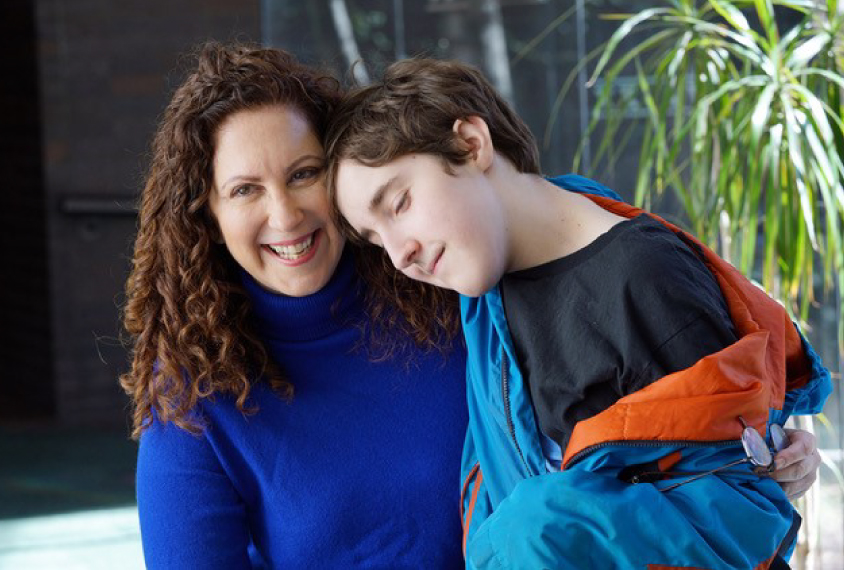Book Review: ‘To Siri with Love’ offers provocative look at parenting
A new book highlights how parenting children with autism is a lot like parenting anyone: You worry, you obsess and, on many an occasion, underestimate everyone, including yourself.

In her upcoming book, “To Siri with Love,” journalist and author Judith Newman explores the affinity some people with autism have for machines and their wonderful predictability.
But another motif surfaces again and again: Parenting children on the spectrum is a lot like parenting anyone. You worry, you obsess, you see your child as frozen in developmental time and, on many an occasion, you underestimate yourself and your child. Actor Paul Giamatti may even keep your son from bolting out the front door at a birthday party. (No, that last thing is probably unique to this book.)
The book is a collection of personal essays that sprang from Newman’s hugely popular 2014 New York Times essay of the same title. Here, she uses vignettes to unspool a through line from her own experiences and those of her husband, opera singer John Snowdon, to the lives of their now-teenage sons. With a mix of sarcasm and brutal self-assessment, she submits an entry in the warts-and-all memoir genre that mostly engages with humor and poignancy, but is at times jarring and painful to read.
She opens the family storybook with a slice of life that’s likely familiar to any parent of young children whose social filters are still works in progress. It’s a scene in a supermarket in which her son Henry goads his brother, Gus, into blurting out that their parents are going to “do sex” when their father gets home from a trip abroad. Henry and Gus are twins, born prematurely in 2001, and Gus has autism.
Newman also sketches her own childhood interests and behaviors, noting that to a “lesser but still marked degree,” she shares many traits with Gus, including significant sensory issues. Her husband has his own set of immutable living specifications, deeply carved into the tablets of his daily life over 80-plus years.
The two of them reside in different homes and have done so throughout their marriage, in part as an accommodation for their unique needs. Although she writes about being the wage earner and having money concerns, the Manhattan-based family seems to live a movie life, with personal caretakers, separate apartments, Paul Giamatti catching runaway children at birthday parties, and access to sets where the actor Andy Samberg films movies.

Intuition transmission:
Given Newman’s recognition of the ways in which her eccentricities mirror her son’s, it’s surprising when she overlooks the commonalities they share. The title of the book references Siri, Apple’s friendly digital assistant, and highlights the appeal that a predictable, even kind, mechanical world holds for some people with autism.
A few of the essays foreground this association: Newman emphasizes Gus’ love of machines — trains, elevators, Siri — and asserts that whereas a typical child might miss an absent parent, Gus misses his absent things and ascribes personality to inanimate objects. Newman herself, in a beloved teenage-years job, imbued the handbags she was selling with so much humanity that she felt bad if she thought one of them was ugly.
Yet the examples she gives illustrate how deeply Gus loves the people in his life. For example, when she compares what her sons want for Christmas, Henry, the neurotypical child, catalogs a dozen material items, such as an iPod and a Nintendo DS. But Gus simply wants “Daddy to come home.” It was a similar event — the return of his father — that had Gus so excited in the book’s opening supermarket scene.
Newman also describes interactions with her own mother that, whether deliberately or not, reflect how Newman has accommodated Gus’ needs throughout his life. The mother, a physician, supported Newman in her first newspaper delivery job by trailing along in the car on early-morning shifts, laden with papers she couldn’t manage on her bike. Newman in turn supports Gus in his first real job, caring for the cat of a tight-fisted neighbor.
The book contains several such links from Newman’s mother to herself and her sons in a chain of parenting style that blends intuition, generosity, patience and candor. Her intuition told her, for example, that one way to calm Gus’ unhappiness about being far from his own things during a vacation would be to take pictures of those things and show them to him. It worked.
Content warning:
Newman’s candor can be unsettling. Her stark presentation of her own thoughts and evolution as the parent of a child on the spectrum will no doubt pain and anger some readers, feelings that certainly alloyed my reading experience. Sections about wanting to have medical power of attorney to be able to ensure Gus is vasectomized, and what it’s like to slide toward the precipice of eugenicist choices, are ethical minefields. And they made for uncomfortable reading.
Several times when I found myself absorbed and enjoying the honesty and humor of Newman’s relationships with both of her sons, these distressing soul-baring revelations jarred me out of a genuinely pleasurable experience.
Yet in this patchwork of loosely linked stories, Newman writes herself as unfixed, quite anxious, sometimes muddled and always mulling different perspectives and possibilities. When she finds herself befuddled, she briskly turns to adults with autism to gain clarity, as when she receives useful insight about sex from one woman with autism or talks to another about the benefits of the repetitive behavior known as ‘stimming.’
The book is a darkly humorous roller coaster ride, dropping to chilly depths of musing about Gus’ reproductive future and then rising upward to a sweeping perspective on all the potential people with autism have. Over and over, Newman discovers that her son can do things she thought he could not or was not ready to do, such as pour milk or walk to school on his own. Her naked revelation of her own perceived failings may resonate with readers who are in the early stages of a similar ride.
Gus comes across as an insightful, naïve, loving and loved boy. His life reads like a fascinating existence among the doormen, celebrities and train riders of New York City, facilitated by his mother’s understanding and flexibility even as she wrestles with the dark spirits that haunt all parents. Gus’ light illuminates his mother’s darkest doubts in every essay. In that sense, he’s lucky. And so is she.
Recommended reading

New organoid atlas unveils four neurodevelopmental signatures
Explore more from The Transmitter
Snoozing dragons stir up ancient evidence of sleep’s dual nature

The Transmitter’s most-read neuroscience book excerpts of 2025


